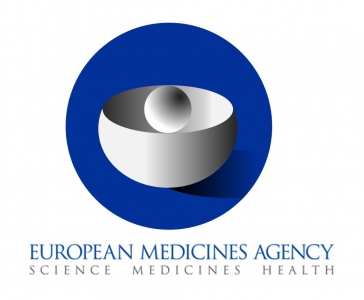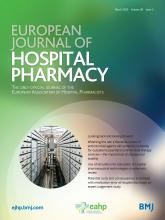The EAHP EU Monitor is a regular round up of news relevant to hospital pharmacy in Europe.
EAHP is collecting new shortage data – share your views!

A few weeks ago, EAHP launched its 2023 Shortage Survey focused on medicinal products and medical devices. Hospital pharmacists, patients and all healthcare professionals working in hospitals are strongly encouraged to share their experiences by 30 April 2023.
New data from all across Europe is vital for EAHP – especially ahead of the upcoming revision of the general pharmaceutical legislation. For the first time, the Association is looking at both the shortage of medicines and medical devices in the hospital environment.
The 2023 Shortage Survey seeks to investigate the reasons and impacts of shortages on patients in European hospitals as well as possible solutions. Besides hospital pharmacists, EAHP’s Survey targets other healthcare professionals working in hospitals, like nurses and physicians, as well as patients and their carers that have experienced medicine shortages during their hospital stay.
The survey can be accessed via the following LINK
IMMUNION project has come to an end
 IMMUNION (“Improving IMMunisation cooperation in the European UNION”) concluded its work and released the project outputs in a booklet. EAHP’s Director of Finance Nenad Miljković was a member of the IMMUNION Scientific Advisory Board.
IMMUNION (“Improving IMMunisation cooperation in the European UNION”) concluded its work and released the project outputs in a booklet. EAHP’s Director of Finance Nenad Miljković was a member of the IMMUNION Scientific Advisory Board.
IMMUNION was a 2-year project co-funded by the European Union’s 3rd Health Programme in 2021-2023. Led by EuroHealthNet, it brought together members of the Coalition for Vaccination, as well as partners working on vaccination across the EU. IMMUNION worked on improving vaccination confidence and uptake, with a focus on underserved populations, by delivering better vaccine education to healthcare professionals and better information to the general public. The project produced various training materials, tools and resources on vaccine communication and confidence, strengthened collaboration with the media on vaccination, helped to gain a better understanding of the drivers of vaccine inequalities and enhanced the visibility of the Coalition for Vaccination.
Access the IMMUNION project booklet HERE
Access other IMMUNION materials HERE
WHO’s list of priority paediatric formulations for antibiotics
 Last month, the World Health Organization (WHO) launched the first ever list of priority paediatric formulations for antibiotics. This initiative aims at increasing targeted research and development efforts that address the specific needs of infants and children.
Last month, the World Health Organization (WHO) launched the first ever list of priority paediatric formulations for antibiotics. This initiative aims at increasing targeted research and development efforts that address the specific needs of infants and children.
The scope of this work was to identify antibiotics with an approved paediatric indication for which age-appropriate formulations are missing and that need to be given priority for development. These antibiotics are on the PAediatric Drug Optimization (PADO) priority list and paediatric formulations should be investigated and developed with a time horizon of three to five years. The exercise also identified antibiotics under clinical development or approved antibiotics without a paediatric indication to be given priority for further development in children. These antibiotics are on the PADO watch list, and paediatric indications should be studied with a time horizon of five to 10 years.
Learn more HERE
Mid-term achievements of the Regulatory Science Strategy published
 The mid-term report prepared by the European Medicines Agency (EMA) provides an overview of the main deliverables achieved between March 2020 and December 2022 across the human and veterinary areas. These focused on the top five human and top three veterinary recommendations.
The mid-term report prepared by the European Medicines Agency (EMA) provides an overview of the main deliverables achieved between March 2020 and December 2022 across the human and veterinary areas. These focused on the top five human and top three veterinary recommendations.
Linked to human health innovation in clinical trials was fostered and the use of high-quality, real-world data in decision-making was promoted. Moreover, patient relevance in evidence generation was reinforced and contributions were made to health technology assessment bodies’ (HTA) preparedness and downstream decision-making for innovative medicines. In the area of precision medicine, biomarkers and ‘omics developments were supported.
In the veterinary field, achievements included transforming the regulatory framework for innovative veterinary medicines, developing new approaches to improve the benefit-risk assessment of veterinary medicinal products and collaborating with stakeholders to modernise veterinary pharmacoepidemiology and pharmacovigilance.
The final report will be published in 2026 once the Regulatory Science Strategy has been completed.
Access the mid-term report HERE
Learn more about EMA’s Regulatory Science Strategy to 2025 HERE
ECDC presents new surveillance framework
 At the beginning of April, the European Centre for Disease Prevention and Control (ECDC) shared its new framework for EU/EEA surveillance of infectious diseases. This new framework builds on the previous multi-annual surveillance strategies.
At the beginning of April, the European Centre for Disease Prevention and Control (ECDC) shared its new framework for EU/EEA surveillance of infectious diseases. This new framework builds on the previous multi-annual surveillance strategies.
It aims at promoting standards, helping bridge the gap between science, policy and practice, providing tailored support to Member States, harnessing technological innovation and collaborating broadly with partners and stakeholders. In addition, it supports the implementation of the recently amended ECDC Founding Regulation and the new Regulation on serious cross-border threats to health.
The new surveillance framework has undergone rigorous review by experts in indicator-based and event-based surveillance, molecular and genomic typing, biostatistics and modelling in ECDC. Following stakeholder consultation, it has been endorsed by the EU Member States and the European Commission.
Access the Long-term surveillance framework 2021–2027 HERE
EJHP: Game-based training to promote handwashing, handrub and gloving for hospital pharmacy operators
 A recent online first article recently published in the European Journal of Hospital Pharmacy (EJHP) looked at game-based training to promote handwashing, handrub and gloving for hospital pharmacy operators. The study measured participants’ satisfaction and effectiveness of a game-based training tool. The tool (Handtastic Boxes) proved to be a highly effective training method for improving knowledge of handwashing, handrub and gloving.
A recent online first article recently published in the European Journal of Hospital Pharmacy (EJHP) looked at game-based training to promote handwashing, handrub and gloving for hospital pharmacy operators. The study measured participants’ satisfaction and effectiveness of a game-based training tool. The tool (Handtastic Boxes) proved to be a highly effective training method for improving knowledge of handwashing, handrub and gloving.
Read the article HERE
[Consultations]
Drug Information Centre Survey
The University Hospitals of Leuven (UZ Leuven) is developing a drug information centre (DIC) to expand their current services. A DIC is defined as a centre that provides technical and scientific information about drugs in an objective and timely manner to ensure the safe and effective use of therapeutic and diagnostic pharmaceuticals. To support the development of the DIC in UZ Leuven a survey has been designed aiming to collect information about the operations, service characteristics and governance of DIC’s already operating in Europe. This survey will take approximately 3-20 minutes to complete depending on the path which is followed.
Contribute to the survey via the following LINK
Bedside clinical pharmacists in Europe
In this research, organized by the Semmelweis University, Hungary the position of bedside clinical pharmacists in hospitals will be assessed to gain insight into the routine practices and the provided clinical pharmacy services. The researchers would like to hear your opinion based on your experiences, so there are no correct or incorrect answers. It takes about 15 minutes to complete the questionnaire.
Contribute to the survey via the following LINK
European Paediatric Formulary: Clonidine hydrochloride oral solution
The European Directorate for the Quality of Medicines & HealthCare (EDQM) has just released Issue 6 of Pharmeuropa PaedForm, in which the draft text for Clonidine Hydrochloride 10 micrograms/mL Oral Solution is published for public consultation with a view to its later inclusion in the European Paediatric Formulary. The deadline for comments is 30 June 2023. This is the seventh monograph elaborated on by the PaedF Working Party. EDQM welcomes all comments on this new monograph from users and interested parties.
Learn more about this consultation HERE
Commission: Stakeholders’ Targeted Consultation on EU4Health
The Commission is inviting key stakeholders to take part in a targeted consultation on the current and future Union health priorities, strategic orientations and health needs that need to be addressed through future EU4Health annual work programmes. The deadline for comments is 8 May 2023.
Access the consultation HERE

























 IMMUNION (“Improving IMMunisation cooperation in the European UNION”) concluded its work and released the project outputs in a booklet. EAHP’s Director of Finance Nenad Miljković was a member of the IMMUNION Scientific Advisory Board.
IMMUNION (“Improving IMMunisation cooperation in the European UNION”) concluded its work and released the project outputs in a booklet. EAHP’s Director of Finance Nenad Miljković was a member of the IMMUNION Scientific Advisory Board. Last month, the World Health Organization (WHO) launched the first ever list of priority paediatric formulations for antibiotics. This initiative aims at increasing targeted research and development efforts that address the specific needs of infants and children.
Last month, the World Health Organization (WHO) launched the first ever list of priority paediatric formulations for antibiotics. This initiative aims at increasing targeted research and development efforts that address the specific needs of infants and children. The mid-term report prepared by the European Medicines Agency (EMA) provides an overview of the main deliverables achieved between March 2020 and December 2022 across the human and veterinary areas. These focused on the top five human and top three veterinary recommendations.
The mid-term report prepared by the European Medicines Agency (EMA) provides an overview of the main deliverables achieved between March 2020 and December 2022 across the human and veterinary areas. These focused on the top five human and top three veterinary recommendations. At the beginning of April, the European Centre for Disease Prevention and Control (ECDC) shared its new framework for EU/EEA surveillance of infectious diseases. This new framework builds on the previous multi-annual surveillance strategies.
At the beginning of April, the European Centre for Disease Prevention and Control (ECDC) shared its new framework for EU/EEA surveillance of infectious diseases. This new framework builds on the previous multi-annual surveillance strategies. A recent online first article recently published in the European Journal of Hospital Pharmacy (EJHP) looked at game-based training to promote handwashing, handrub and gloving for hospital pharmacy operators. The study measured participants’ satisfaction and effectiveness of a game-based training tool. The tool (Handtastic Boxes) proved to be a highly effective training method for improving knowledge of handwashing, handrub and gloving.
A recent online first article recently published in the European Journal of Hospital Pharmacy (EJHP) looked at game-based training to promote handwashing, handrub and gloving for hospital pharmacy operators. The study measured participants’ satisfaction and effectiveness of a game-based training tool. The tool (Handtastic Boxes) proved to be a highly effective training method for improving knowledge of handwashing, handrub and gloving.